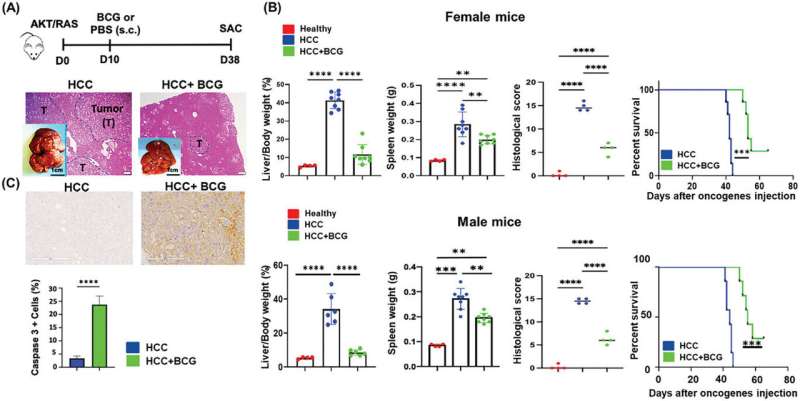This article has been reviewed according to Science X's editorial process and policies. Editors have highlighted the following attributes while ensuring the content's credibility:
fact-checked
trusted source
proofread
TB vaccine shrinks liver cancer tumors in mice

A UC Davis Health study found that a single dose of Bacillus Calmette-Guérin (BCG), the vaccine for tuberculosis (TB), reduced liver tumor burden and extended the survival of mice with liver cancer. The study, published in Advanced Science, is the first to show the promising effects of the vaccine in treating liver cancer.
Hepatocellular carcinoma (HCC) is the most common type of liver cancer. It is also the third leading cause of cancer-related deaths worldwide. Current therapies include surgery, radiotherapy, chemotherapy, immunotherapy and liver transplant. Yet, the therapy outcomes for liver cancer remain bleak.
BCG, the century-old TB vaccine, is derived from the live bacteria Mycobacterium bovis. It is considered safe and widely used around the world.
BCG is also known to boost the body's immunity. The U.S. Food and Drug Administration has approved it for the treatment of bladder cancer. Yet, the potential effect of BCG in treating solid tumors, such as those of liver cancer, remained unknown.
The new study, led by Distinguished Professor Yu-Jui Yvonne Wan, showed that one dose of BCG delivered under the skin reduced tissue scarring (fibrosis), improved liver function, lowered liver lipid, and shrunk the tumor.
"HCC is very difficult to treat. This cancer is considered a cold tumor, which does not respond well to immunotherapy," said Wan, the study's senior author and vice chair for research in the UC Davis Department of Pathology and Laboratory Medicine. "We had a good reason to believe that the BCG vaccine could stimulate an immune response. So, we gave a dose of BCG to mice with liver cancer, and to our surprise, it was enough to activate the body's immune system and reduce tumor load."
How does the TB vaccine fight liver cancer?
The researchers gave a BCG dose under the skin to mice with liver cancer. This is the same way the BCG vaccine is given to humans. They found that BCG reduced inflammation and promoted the work of immune T cells. It specifically allowed the infiltration of CD4+ and CD8+ T cells and M1 macrophages into the tumor.
"We discovered that the BCG treatment resulted in the movement of T cells and macrophages to the tumor. It also activated the body's immunity and enhanced IFN-γ signaling, which contributes to an anti-HCC effect," Wan said.
Macrophages are white blood cells that can fight cancer. BCG induced IFN-γ signaling, resulting in cancer cell death.
The study also tested if the effects of BCG on liver cancer are sex dependent.
"While previous studies have shown sex differences in BCG effects on immunity, our data showed that both male and female HCC mice responded to the BCG treatment," Wan added.
A better immunotherapy for liver cancer
Bacterial immunotherapy, such as BCG, offers an alternative to current immunotherapy based on immune checkpoint inhibitors. It has the potential to revolutionize the treatment approach for HCC.
"Our study showed that BCG immunotherapy for HCC is different from and superior to other immunotherapies. It requires only a single injection. In animal models, BCG generated better anti-liver cancer treatment outcomes than other standard immunotherapies, such as anti-PD-1. This means a potentially more simplified treatment plan," Wan explained.
Future directions
The study findings suggest that the BCG vaccine could be repurposed as an HCC treatment. The discovery is significant, since BCG is already used safely around the world.
The researchers point to the need to explore the potential preventive ability of BCG and whether multiple doses would be even more effective at combating liver cancer. The efficacy could also be boosted through dosage adjustments, different timing and number of doses.
"If BCG treated a tough tumor like liver cancer, I'm optimistic it can work well on other hard-to-treat cancers. We would need more research to move to the next step. For example, we don't know how long this immune memory lasts, so efficacy of this vaccine over time is still a mystery. The mechanism can be complicated, and further research is needed," Wan explained.
The team also recommended examining the impact of BCG on the gut microbiome via the gut-liver axis.
More information: Farzam Vaziri et al, BCG as an Innovative Option for HCC Treatment: Repurposing and Mechanistic Insights, Advanced Science (2024). DOI: 10.1002/advs.202308242




















